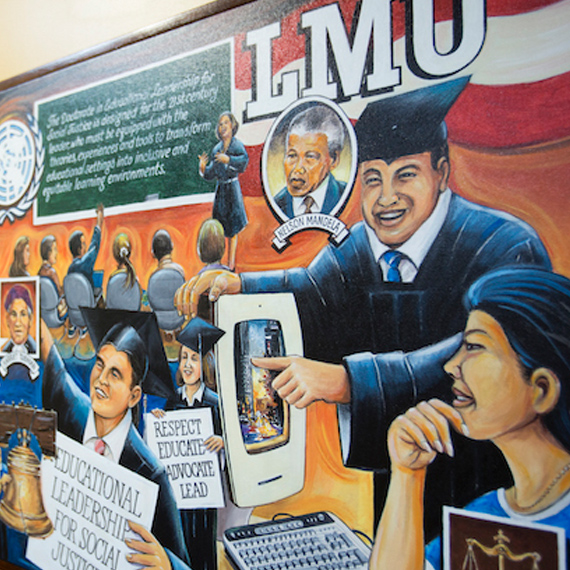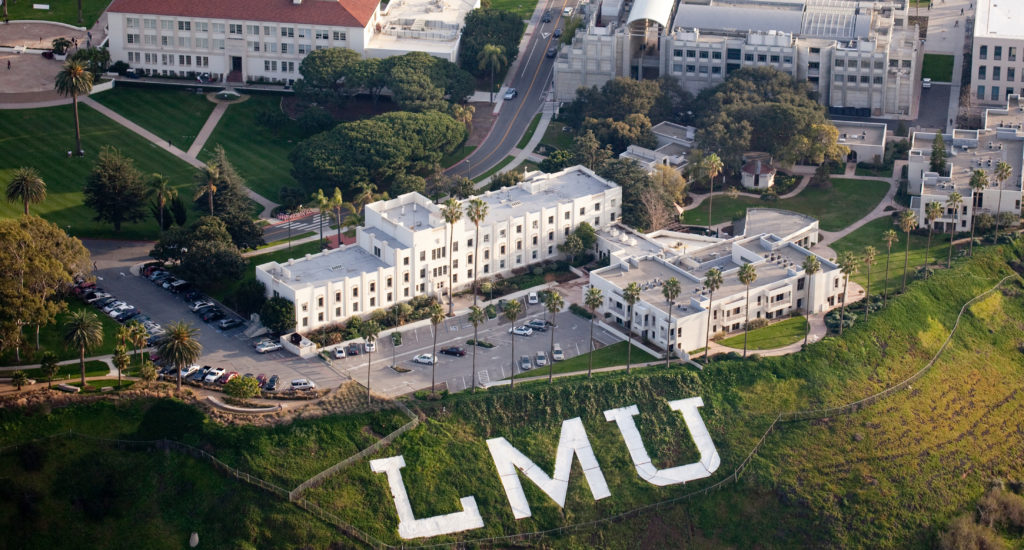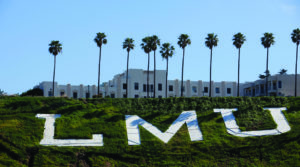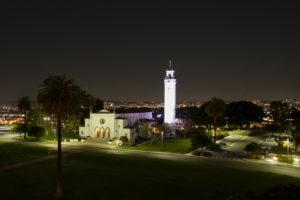MISSION AND MINISTRY | Since 2000, LMU has offered grants to support curriculum development and research focusing on faith and justice. In response to a call by Father Peter-Hans Kolvenbach, superior general of the Society of Jesus, for universities to make space for “the gritty reality of this world” to enter into our lives so that we can “learn to feel it, think about it critically, respond to its suffering, and engage it constructively,” LMU offered support to faculty across campus to deepen the connection of faith and justice to their work.
In the 2020-21 academic year, 11 faculty members from across the university received grants to do work in faith and justice this academic year. The projects range from highlighting environmental justice issues to teaching Ignatian pedagogy in a theater course. Each project reflects on the sources of systemic oppression and marginalization through innovative curriculum and research.
“By creating this grant we’re asking faculty to think very clearly about how their work promotes justice,” said Cathleen McGrath, the chair of the Mission and Identity Committee and professor of management. “This process involves not just the faculty members who created it, but also the department chair and the dean of the college. We’re reinforcing the importance of this throughout the institution, rather than being a faculty member on their own saying, ‘Oh look, I do all this work in support of justice,’ we as an institution, are supporting their work.”
The Faith and Justice Curriculum Development Grants provide resources for faculty to cultivate a focus on justice in their courses. Faculty use the grant resources to take time to develop their curriculum and make connections with others to support their work.
Nicole Bouvier-Brown, associate professor of chemistry and biochemistry in Frank R. Seaver College of Science and Engineering, was able to spend time during the summer incorporating elements of Ignatian pedagogy into “General Chemistry.” A welcome relief from stressing about preparing for online teaching and learning. She collaborated with a student to create specific computational examples that highlight environmental justice issues. For example, students were introduced to the chemical formation of chloroprene, a side product of neoprene synthesis that is off-gassed in Cancer Alley, Louisiana. Through this course, she learned that students (in the class as well as student researchers) are very interested in environmental justice issues. Allowing students to take a moment to reflect on these ideas helps them think about how their scientific knowledge and skills can impact people in the “real world.”
Tara Pixley, assistant professor of journalism in LMU Bellarmine College of Liberal Arts, was able to take to time collaborate over the summer with her colleague Jason Jarvis, assistant professor of communication studies in the LMU College of Communication and Fine Arts, building the syllabus, planning out an extensive array of guest speakers, writing a Core Course proposal, and writing an article on the course pedagogy for Communication Teacher.
Stacey Cabaj, assistant professor of acting and pedagogy for theatre arts, was able to use the support to spend necessary time for course (re)design. Also, she was able to work with Mission and Ministry staff on mentorship for Ignatian pedagogy as well as fostering connections with faculty in theatre arts at other schools in the AJCU.
Madhu Viswanathan, a marketing professor in the College of Business Administration, was one of the recipients of the award for his “Business for Good” course. “Everything I do is very bottom up,” said Viswanathan. “I really believe, unapologetically, in bringing humanity into business.” More than 700 business students have taken his course, which involves a project where students design a business plan to launch of a product for low-income customers in domestic or international markets, while achieving economic sustainability as well as social and environmental sustainability. “I think the benefit [to students] is first of all, to learn from and to think about people who are very different from them, particularly socially, economically, and geographically. I am very big believer that exposure is education,” said Viswanathan.
In 2020-21, faculty used the support of the Faith and Justice Grants to identify and develop the relationship of their research to faith and justice. The grants also supported student engagement in faculty research.
Joy Ee, assistant professor of teaching and learning in the School of Education, used the resources of the Faith and Justice grant to support her research sharing the voices of numerous educators across the nation in terms of how they have supported students from immigrant households under the harsh immigration enforcement policies and actions. She explains that her work is, “simultaneously my own way to practice public goods guided by the faith and justice that our communities share together.”
Aidin Namin, assistant professor of marketing in the LMU College of Business Administration, used the Faith and Justice Research Grant to support his research exploring the presence of discrimination in the U.S. labor markets. He explains that, “promotion of justice is one of the pillars in LMU mission, and is one of the priorities of our institution — this has been emphasized in my research using an advanced analytics technique.” He was able to engage students in his research as part of a graduate Master of Science in business analytics (MSBA) course. By using the data from Namin’s research to run a latent class analysis model and write a report based on their findings, students get to practice the analytics model and they will also realize how analytics can be used in dealing with social justice issues. Namin said, “While I wrote this proposal, and have been selected for the award, before the unfortunate situation of George Floyd, I am glad that my proposed study has been fully inline what the BLM movement and taking action against systemic racism and improving equity issues. The proactiveness of this proposal (and later its fit with what happened since May 2020), was surprising to me in a very positive way.”
Mandy Korpusik, assistant professor of computer science in Seaver College, used her Faith and Justice Research grant to work with three master’s degree students and three undergraduate students on projects related to her spoken diet tracking research. She said, “Sophomore computer science major Kira Toal was helping me to build a nutrition-specific speech recognizer in the Kaldi toolkit. Sophomores Maya Epps (computer science) and Juan Uribe (applied physics) published a paper at the Spoken Language Technology (SLT) conference on their work adding an exercise logging component to the system. Computer science graduate student Rachit Patel is working on personalized food recommendations using collaborative filtering, content-based recommendation, and knowledge-based recommendation. Finally, Computer science graduate students Bryan Moncada and Mansi Prajapati worked on the 9th Dialogue System Technology Challenge track for predicting when out-of-domain knowledge is required to answer a user’s query.”
Six faculty members were awarded funds to support curriculum development for courses that integrate issues of faith and justice that are aligned with LMU’s mission: Nicole Bouvier-Brown, associate professor of chemistry and biochemistry; Stacey Cabaj, assistant professor of acting and pedagogy; Jason Jarvis, assistant professor of communication studies; Tara Pixley, assistant professor of journalism; and Zhen “Richard” Tang, assistant professor of marketing, and Madhu Viswanathan, professor of marketing.
In addition, five research grants were also awarded to support faculty work that integrates issues of faith and justice aligning with LMU’s mission: Jongyeon “Joy” Ee, assistant professor of teaching and learning; Mandy B. Korpusik, assistant professor of electrical engineering and computer science; Aidin Namin, assistant professor of marketing; Áine O’Healy, professor of modern languages and literatures; and Rebecca Sager, associate professor of sociology.
Dozens of faculty members from many fields apply for the faith and justice grants every year, demonstrating how committed faculty are to LMU’s mission. “We have a sophisticated and fruitful conception of justice at LMU,” said McGrath. “It really considers the relationship among people and the environment, and I think the interconnection with faith is a very complex and very sophisticated conception of justice. And understanding this complexity ultimately benefits LMU students the most.”




